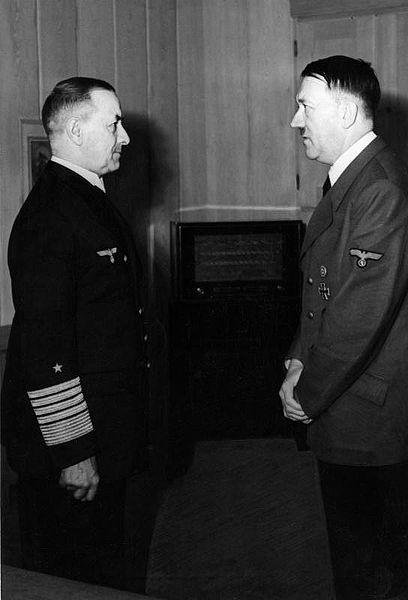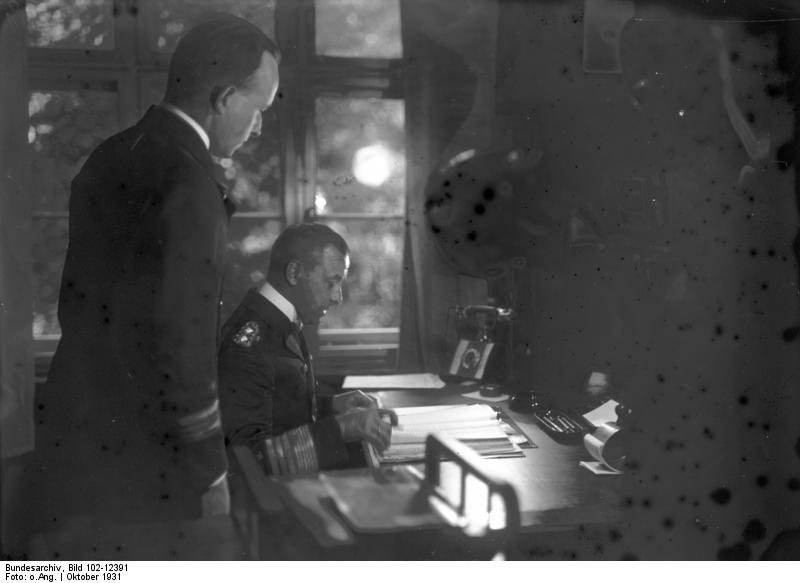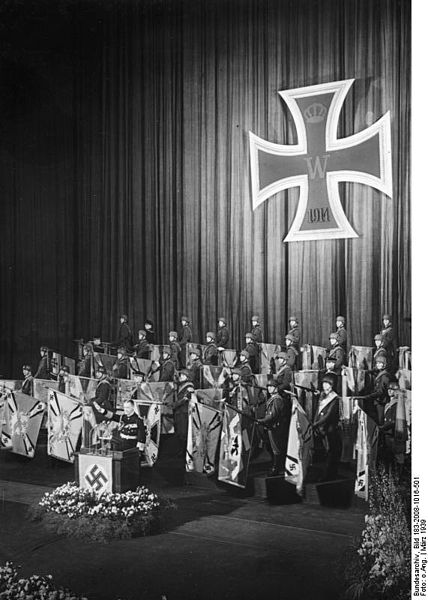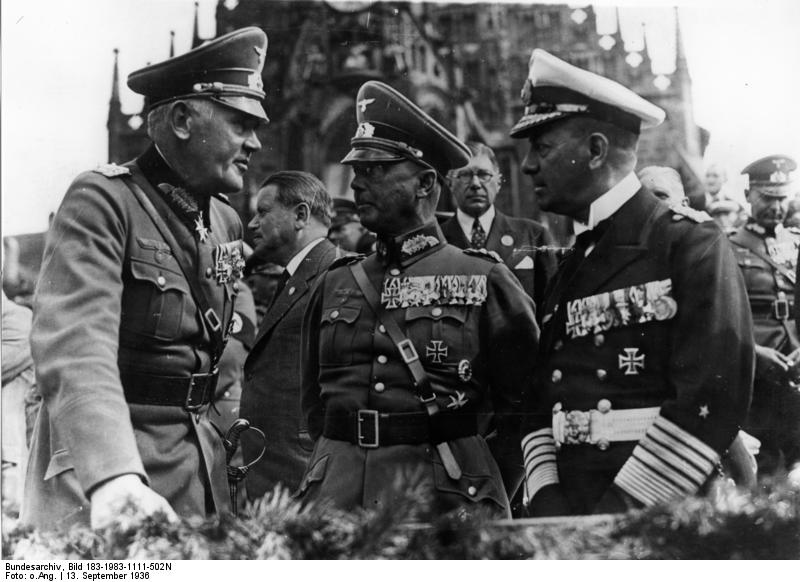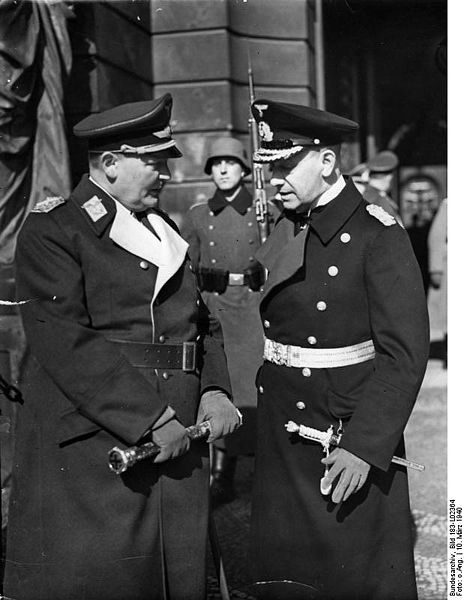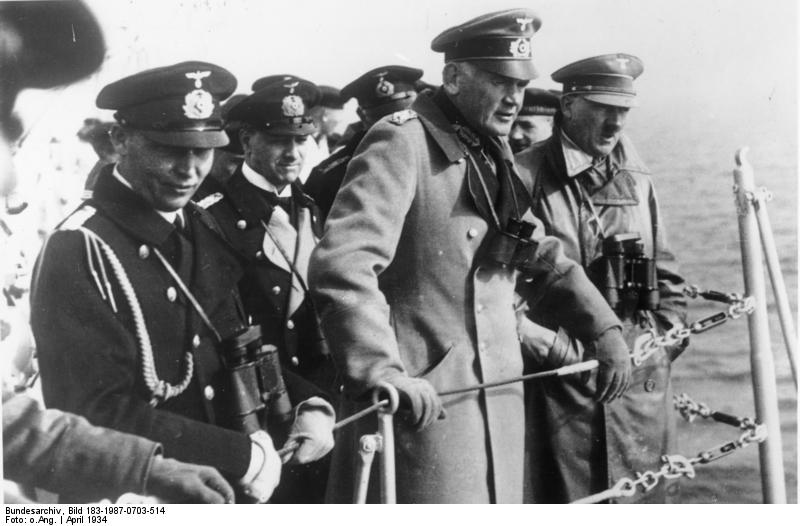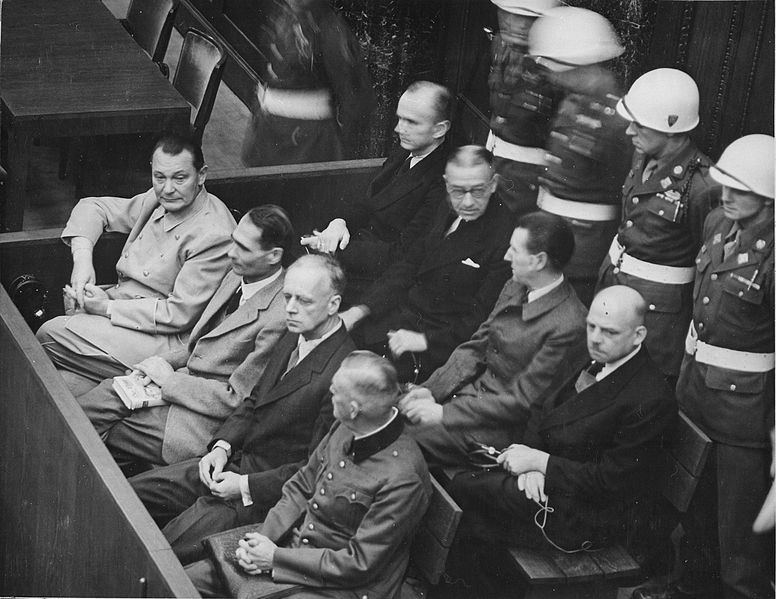<Back to Index>
- Economist Karl August Fritz Schiller, 1911
- Writer Anthony Trollope, 1815
- Großadmiral of the German Navy Erich Johann Albert Raeder, 1876
PAGE SPONSOR
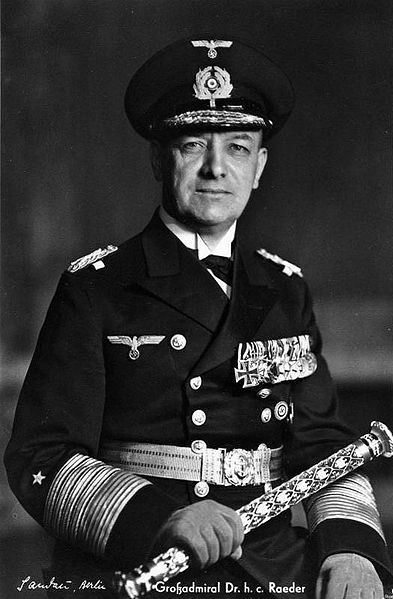
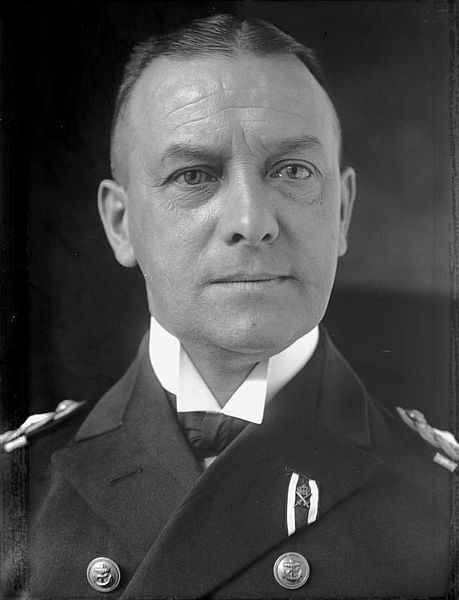
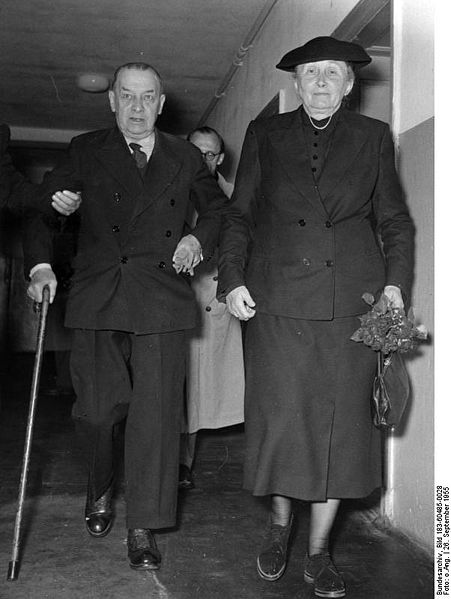
Dr. phil. h.c. Erich Johann Albert Raeder (24 April 1876 – 6 November 1960) was a naval leader in Germany before and during World War II. Raeder attained the highest possible naval rank — that of Großadmiral (Grand Admiral) — in 1939, becoming the first person to hold that rank since Alfred von Tirpitz. Raeder led the Kriegsmarine (German Navy) for the first half of the war, but resigned in 1943 and was replaced by Karl Dönitz. He was sentenced to life in prison at the Nuremberg Trials, but was later released.
Raeder was born into a middle class family in Wandsbek in the Prussian province of Schleswig - Holstein in the German Empire. His father was a headmaster. He was the captain of Kaiser Wilhem II's private yacht in the years leading up to World War I. He joined the Kaiserliche Marine (Imperial Navy) in 1894 and rapidly rose in rank, becoming Chief of Staff for Franz von Hipper in 1912. He served in this position during World War I as well as in combat posts, taking part in the Battle of Dogger Bank in 1915 and the Battle of Jutland in 1916. After the war, in 1920, Raeder was involved in the failed Kapp Putsch, and after its suppresion he was marginalized in the Navy, being transferred to the Naval Archives, where for two years he studied naval history. Raeder also was the author of a number of studies about naval warfare, something that resulted in his being awarded a Doctor of Philosophy decreehonoris causa by the University of Kiel.
After this, Raeder continued to rise steadily in the navy hierarchy, becoming a Konteradmiral (Rear Admiral) in 1922 and a Vizeadmiral (Vice Admiral) in 1925. In October 1928, Raeder was promoted to Admiral and made Commander - in - Chief of the Reichsmarine, the Weimar Republic Navy (Oberbefehlshaber der Reichsmarine).
Although he generally disliked the Nazi Party, he strongly supported Adolf Hitler′s attempt to rebuild the Kriegsmarine, while apparently disagreeing strongly on most other matters. On 20 April 1936, just a few days before Raeder's 60th birthday, Hitler promoted him to Generaladmiral (General Admiral). In his quest to rebuild the German Navy, Raeder faced constant challenges from Hermann Göring′s ongoing quest to build up the Luftwaffe. He was promoted to Großadmiral (Grand Admiral) in 1939, becoming the first to hold that rank since Alfred von Tirpitz. Later that year, he suggested invading Norway in order to secure sheltered docks out of reach of the Royal Air Force, as well as provide direct exits into the North Sea,
but was strongly opposed by the German Naval Staff and "[A]t the end,
Raeder agreed that the 'best' solution was preservation of the status
quo." Norway
was vital to Germany as a transport route for iron ore from Sweden, a
supply that Britain was determined to stop. One adopted British plan
was to go through Norway and occupy cities in Sweden. An
Allied invasion was ordered on 12 March, and the Germans intercepted
radio traffic setting March 14 as deadline for the preparation. Peace
in Finland interrupted the Allied plans, but Hitler became, rightly,
convinced that the Allies would try again, and ordered operation Weseruebung. The new Allied plans were Wilfred and Plan R 4.
The plan was to provoke a German reaction by laying mines in Norwegian
waters, and once Germany showed signs of taking action UK troops would
occupy Narvik, Trondheim and Bergen and launch a raid on Stavanger to destroy Sola airfield.
However "the mines were not laid until the morning of 8 April, by which
time the German ships were advancing up the Norwegian coast." Raeder argued strongly against Operation Sea Lion,
the planned German invasion of Great Britain. He felt that the war at
sea could be conducted far more successfully via an indirect strategic
approach, by increasing the numbers of U-boats and small surface vessels in service. He also had doubts about Germany's ability to gain air superiority over the English Channel and
the lack of regional German naval superiority. Air supremacy was a
prerequisite to successfully preventing destruction of the German
invasion fleet by the Royal Navy. Instead, Raeder favored a strategic focus on the Mediterranean theater including a strong German presence in North Africa, plus an invasion of Malta and the Middle East. He believed that capturing Gibraltar, the Canary Islands and the Suez Canal would knock the United Kingdom out of the war. For instance, Raeder once told Hitler that a major offensive against Egypt and
the Suez gave Germany a chance to strike a blow that "would be more
deadly to the British Empire than the capture of London!" On several
occasions, he suggested that Hitler send the vaunted tank commander Erwin Rommel to Egypt. Hitler finally relented in 1941, and only then to relieve the Italians. The invasion was postponed indefinitely due to the Luftwaffe′s failure to obtain air superiority during the Battle of Britain,
and the significantly greater power of the Royal Navy over the German
Naval forces. Instead, the German war machine was diverted to Operation Barbarossa, the German invasion of the Soviet Union,
which he vigorously opposed. Raeder thought Hitler was so fixated on
wiping out the Soviet regime that he didn't realize that a larger,
global strategy could have easily tipped the balance in Germany's favor.
A series of failed operations after that point, particularly the
Battle of the Barents Sea — combined with the outstanding success of the U-boat fleet under the command of Karl Dönitz — led to his eventual demotion to the rank of Admiral Inspector of the Kriegsmarine in January 1943. Raeder offered his resignation as an apology and formally resigned from Kriegsmarine in May 1943. Dönitz succeeded him in the post of Commander - in - Chief of the Navy on 30 January 1943. Raeder was suspected of involvement in the 20 July plot, but immediately cleared himself by going to Rastenburg to personally assure Hitler of his loyalty. After the war, Raeder was sentenced to life imprisonment at the Nuremberg Trials, for waging a war of aggression, a charge arising from his planning of the German invasion of Norway. The
German defense in the Nuremberg trials in 1946 argued that Germany was
"compelled to attack Norway by the need to forestall an Allied invasion
and that her action was therefore preemptive", e.g. such as argued for the Anglo - Soviet invasion of Iran. The German defense was referring to Plan R 4 and
its predecessors. However the International Military Tribunal at
Nuremberg determined that no Allied invasion was imminent, and
therefore rejected the German argument that Germany was entitled to
attack Norway. The
sentence was later reduced and, due to ill health, he was released at
11:35 on 26 September 1955. After his release he settled down at the Uhlandstrasse in Lippstadt, Westphalia. He later wrote an autobiography, Mein Leben, in 1957. Erich Raeder died in Kiel on 6 November 1960.
